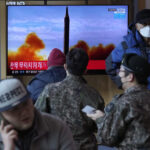
Feb. 26—ANDERSON — While the war between Russia and Ukraine runs hot because of the military involvement, the United States once again may be entering a diplomatic cold war with the eastern European superpower whose president, Vladimir Putin, appears to be reaching for his nation’s former glory.
“I think we are unfortunately moving in that direction. That’s the problem with having an autocratic state with a despot as a leader,” said. Anderson University President John S. Pistole, a former deputy director of the FBI. “I think he is testing the bounds of resolve for NATO, which he sees as a threat. But a cold war is better than a hot war. No one wants World War III.”
However, Russia’s invasion may be nothing more than the act of a desperate bully who may appear to be an aggressor but actually is on the defense, he said.
“I think it’s a huge gamble by him,” Pistole said. “He feels cornered and hasn’t been able to bully the international community over the past few months. He hoped he could install a puppet leader, and that just hasn’t happened.”
Still, Pistole said, the invasion puts the United States and its NATO allies on the defensive.
Though some have speculated Putin’s next move might be to reclaim the Baltic states of Estonia, Latvia and Lithuania, Pistole said he doesn’t believe the U.S. and NATO would allow Russia to go that far.
When Pistole started his career with the Federal Bureau of Investigation decades ago, the United States was in the midst of a decades-long Cold War with Russia. Though he never served overseas and the focus of the agency shifted to the war on terror in the Middle East as he rose to leadership, Pistole did meet with his Eastern European counterparts in Ukraine’s capital of Kiev when he was the FBI’s deputy director.
Since the World Trade Center was struck by al Qaida on Sept. 11, 2001, American and Russian spies halted much of their activity against one another and turned their attention to the Middle East, Pistole said. He assumes those days of cooperation may be over.
“One of the things is, can you trust them?” he said.
Because he was an intelligence officer in the Soviet Union’s KGB, Putin was on the FBI’s radar, Pistole said.
“He was clearly a force to be reckoned with,” he said. “Even after he left the KGB, he was seen as the power behind the throne.”
This new possible cold war likely will center around the use of technology, Pistole said.
“That’s the first wave of attack. They did cyberattacks that control Ukraine’s ability to respond effectively.”
Russia also already is believed to have used cyberattacks against U.S. interests. One of the problems, Pistole added, is cyberattacks can spread beyond the intended target.
“The one thing I would say about Russia and Putin is that they are unpredictable,” he said. “I have no idea where it’s going to end up, but I would say one thing to look out for is the unintended consequences of the cyberattacks. Bad things can happen for lots of people.”
Putin also may underestimate the ability of the U.S. and NATO to employ technology by, for instance, freezing the assets of its billionaire oligarchs who have money stashed around the world, Pistole said.
But AU political science Professor Michael Frank said he doesn’t see the U.S. going back into a cold war with Russia, primarily because of a lack of political unity at home.
“There is a sizeable group that seems to be pro-Russia and supporting this move into Ukraine,” he said. “We aren’t united against Russia. We don’t collectively see Russia as an adversary. I think the Cold War is in the past, and it would require us to see a common enemy, and we don’t. It weakens us on the world stage to have that kind of infighting.”
That same disunity can be found in other nations and even between allies, making a military strike also unlikely, Frank said.
“NATO is going to have to figure out where their red lines are and make sure there is a unity of purpose among their members,” he said.
Even so, it’s more likely the allies would take an extended diplomatic and economic sanctions route rather than military action, Frank said.
“It boils down that Russia has a sizeable military and a resolve to use that capability, and they have nuclear and cyber capability as well,” he said. “If we were to take any action, we would be wounded significantly.
“We suffered significant casualties in Afghanistan and Iraq,” he added. “That was against enemies that didn’t have the same capabilities and financing.”
Jaye Lee Rogers, chair of AU’s history department, said that with the current political climate and the division among Americans, some of whom support the invasion of Ukraine, it’s unlikely President Joe Biden would send troops.
That’s why Germany will be the western nation to watch, she said. Because about 40% of the natural gas consumed by Germans comes from Russia and the eastern part of Germany was part of the Communist bloc during the first Cold War, it has the most to lose.
“If it gets hard on them, they may feel they need to take military action,” she said.
Follow Rebecca R. Bibbs on Twitter at @RebeccaB_THB, or call 765-640-4883.




